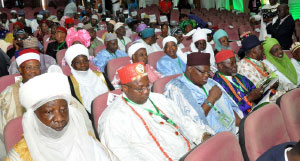Apart from power devolution, no other topic at the ongoing national conference may generate as much heat as debates on fiscal federalism, which is where the issue of resource control comes in. Though the committee that dwelt on this matter had submitted its reports making far-reaching recommendations, it is not yet tabled at the plenary for general discussion. However, Assistant Editor (North), CHUKS EHIRIM, sampled opinions of some delegates on the issue
confabNo alternative to internally-generated revenue – GHALI UMAR NA’ABBA (Former Speaker, House of Representatives)
I cannot speak for any other person but myself. I think it is good innovation for any state to organise and generate revenue from activities going on internally. That is all I can say on it for now.
Emphasis should be on production – EMMA UGBOAJA, Nigeria Labour Congress (NLC) delegate
It is about production. The emphasis should be on production. The idea of people talking about sharing is totally different from what obtains where I come from. I come from a working background. We talk about work; we talk about producing; we talk about generating wealth, not just about sharing it.
You must first underline the principle of producing it before you can then go into the demographic nature of sharing it. The premise upon which people talk of sharing even what they have not seen and what they don’t intend to produce, is wrong. It is not real. One would have expected that the new Nigeria we are dreaming about should be the Nigeria that talks about producing. And as long as our emphasis is more on sharing, that cannot be the way to go. If you ask people, they will tell you they are just interested in the sharing formula. They must be encouraged to produce.
Fiscal federalism should be anchored on productivity – LANRE OGUNDIPE, former President of the Nigeria Union of Journalists (NUJ)
The entire thing centres on lack of understanding. What we have been hearing from noisy neighbours is not what we can build anything on – the idea of just collecting money and going somewhere to share the loot. What we have seen in the last 15 years of democracy is just sharing of loot, not dividends of democracy.
When you talk about fiscal policy, you build it around productivity. When that one reaches a stage where you can reap the benefits accruing from it, you then start thinking of democratisation. Democratisation does not come in when you have nothing on ground. What we have seen in the last couple of years is that people say: okay, go into this and collect money and share nothing to the general public. That is why we are saying that all these things need to be devolved. By the time it is devolved, you can now hold people accountable. Can you now hold the federal government accountable at the local government level? The answer is an emphatic no. So those are the things we are saying.
We must address issues of derivation, resource control – SAM EGU, a delegate from Kogi State from civil society background.
The principle of federalism is that the constituent units of a federation should be sufficiently autonomous in terms of allocation of political powers and fiscal powers, to deal with their local powers and development issues. And once you get that very clearly, you understand there are two elements of fiscal federalism that you need to deal with in this country.
One is what you may consider as the vertical fiscal relations between the federal government and constituent units. My take on it is that, given the mood of this country, our federal system needs to be reformed. Power needs to be devolved from the centre to the states. We require some sincerity in statutory distribution of funds between the federal government on the one hand and the states on the other, which I think should review what is available to the federal government in favour of the states while still ensuring that the federal government is strong enough to cater for the overall unity of the country.
The second element of fiscal federalism is the distribution of revenues among the sub units. Again, given the rising tide of the issue of self-determination, the need for greater autonomy and encouraging the sub units to also expand the scope of their revenue, we cannot run away from issues of derivation or resource control. My proposal is that even with the current 13 per cent for the oil-producing states, which though has already created a situation of fiscal imbalance between them and the rest of the country, in terms of what they are taking home and what the non-oil-producing states are taking home, you still require, in the name of justice and fairness, dealing with the peculiar challenges of the oil-producing states and communities, to increase that allocation, from 13 per cent to a minimum of 20 per cent or 25 per cent.
You also need to take additional measures to support states whose revenue fall below the national average, so that they can maintain national minimum standard because that is why, in most federal systems, you have what is called ‘grabbing age’, which is a periodic effort by the federal government to intervene in the fiscal functions of states that fall below the national average. These are the kind of things we should be doing.
Nigeria yet to practise true fiscal federalism – OBI ANOLIEFO, former House of Representatives member (1991- 1993)
We haven’t got fiscal federalism yet. One would have expected that you wait to see what the people who are responsible for that have for us and not pre-judge anything or anybody. Fiscal federalism is going to come, perhaps, between one or two committees – Devolution of Power and Restructuring of Government. So I don’t want to pre-judge any of these committees.
Urgent need to address plight of oil-producing states – HAJIA RAMATU USMAN, immediate past president of National Council of Women Societies (NCWS)
There are issues that I am still learning here. You know, as a civil society person, we are more concerned with civil matters. So I don’t understand, very well, the fiscal federalism thing until it is discussed. The report of that committee has not been discussed. But if I should speak now, it will be from a layman’s point of view. I believe that in the long run, at the end of this discussion, the majority decision will be for states to control their resources and then taxes should be paid to the federal government.
Some of us, who have had the opportunity to go to the oil-producing states, have seen abject poverty. Though the North is poorer, those oil-producing areas are really suffering. If I am given the opportunity, I will say that oil pipelines should go to the houses of those who live in the oil-producing areas, so that suffering would stop. We like copying from developed countries, but do not practise it when we come back home. In all the developed countries, the people who are from the oil-producing areas have pipes laid to their homes. When will the suffering of the woman stop?
So that is it. We discussed it at the plenary, but the report of the committee is yet to be discussed. We will peruse it together when the time comes and I think a reasonable percentage will be given to the oil-producing states.
Review of allocation formula the answer – AUWAL IBRAHIM MUSA RAFSANJANI, civil society representative
It is very clear that we need to do something to amend how fiscal federalism operates in Nigeria, which has not been serving any purpose for anybody. First and foremost, there is the belief that economic diversification is so important. The way we are now, we encourage laziness in the economic investment and expansion in our economic activities. There is no industrialisation. Nothing is happening, and this is not good for any country concentrating on one economy.
Therefore, in trying to look at fiscal federalism, we need to see how we can expand and diversify our economic activities, so that we can have sufficient income that will be distributed fairly and equitably across the country, to encourage development and ensure that laziness is also discouraged.
I think we need to do everything possible to ensure that the states and local government areas receive sufficient allocations, for them to be able to build for development, because giving the federal government a large share of the country’s revenue is also what is heating up the polity at the national level.
Everybody wants to come to the federal level; nobody wants to focus on other developmental things at the states or local government levels. By so doing, we end up wasting a lot of money, and states and local governments are not receiving sufficient allocations. So I want to suggest that we look at the allocation to the federal government and also increase the allocations to the states and local governments, so that development could reach the grassroots.













